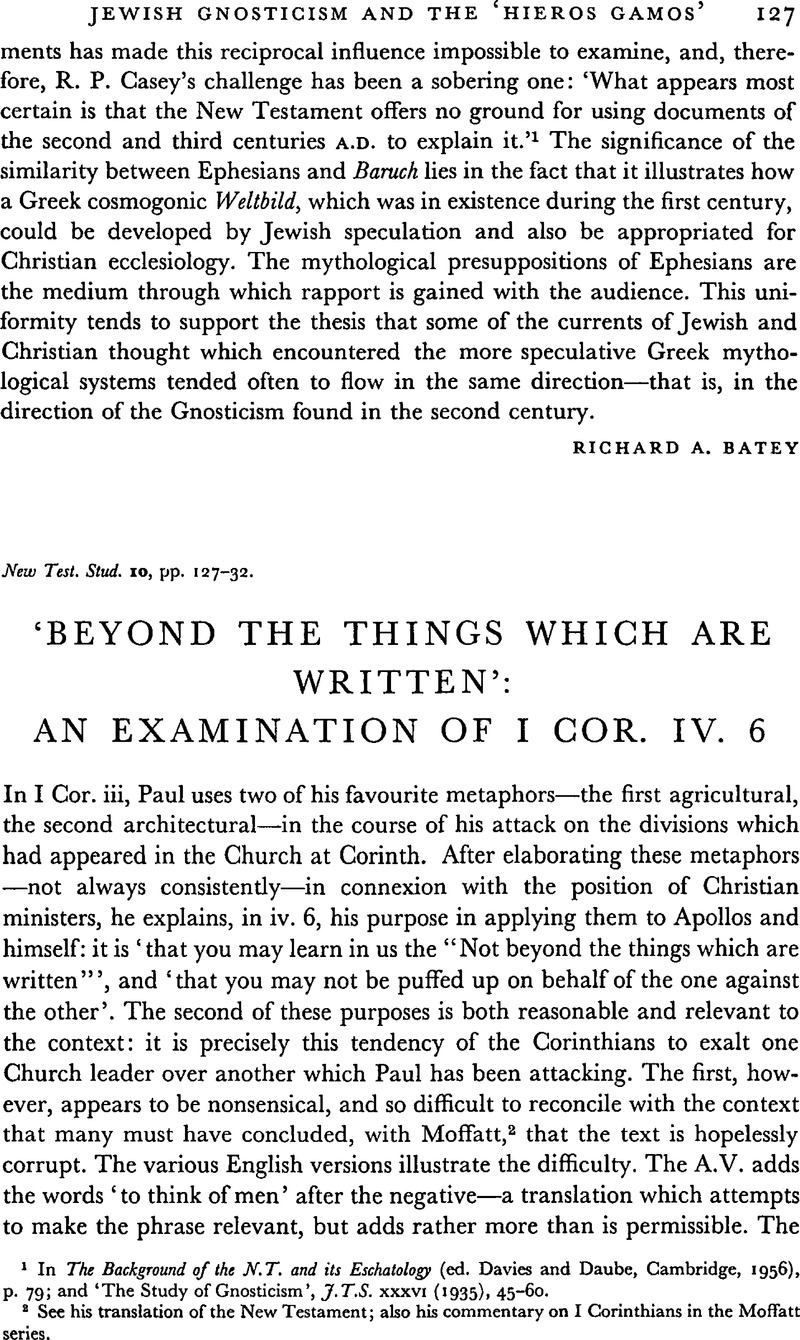Article contents
‘Beyond the Things which are Written’: An Examination of I Cor. IV. 6
Published online by Cambridge University Press: 05 February 2009
Abstract

- Type
- Short Studies
- Information
- Copyright
- Copyright © Cambridge University Press 1963
References
page 127 note 1 In The Background of the N.T. and its Eschatology (ed. Davies and Daube, Cambridge, 1956), p. 79; and ‘The Study of Gnosticism’, J.T.S. xxxvi (1935), 45–60.
page 127 note 2 See his translation of the New Testament; also his commentary on I Corinthians in the Moffatt series.
page 128 note 1 See, e.g., R. St J. Parry, Cambridge Greek Testament: I Corinthians (1916), in loc., who suggests that λέγραπταı ‘is used in a technical sense’ but not the ‘usual technical sense’, and interprets it as the ‘terms’ of a teacher's commission. This interpretation is difficult in view of Paul's usage of λέγραπταı in the ‘usual technical sense’ elsewhere. H. Lietzmann, Handbuch z. N.T.: An die Korinther I–II (Tübingen, 3rd ed. 1931), refers to Heinrici's suggestion that Paul is defending himself against an accusation of unscriptural teaching, and using his opponents’ own motto. Such a charge seems unlikely, and its rebuttal would not fit the context here.
page 128 note 2 See Howard, W. F., ‘I Cor. 4. 6’, in E.T. XXXIII (1922), 479 f., who summarizes the arguments of Weiss, Baljon and Bousset.Google Scholar
page 131 note 1 Phil. iii. 21; II Cor. Xi. 13–15.
page 131 note 2 Robertson, A. and Plummer, A., I.C.C.: I Corinthians (1911), in loc.Google Scholar
page 131 note 3 Cf. Allo, E.-B., Saint Paul: Premiére Épître aux Corinthiens (Paris, 1934), for a similar conclusion.Google Scholar
page 131 note 4 For a change in form cf. Philo, Leg. ad Gaium 80: ![]()
![]()
page 131 note 5 Cf., however, Plato Leg. 906c, where ρήματı μετεσχηματıσμένον refers to the ‘verbal change’ whereby what is called ‘disease’ in the body is known as ‘injustice’ in the State.
page 131 note 6 E.g. Ps.-Demetrius De Eloc. 298: περι μέν δν πλάσματος λóγου και σχηματıσμῶν άρκειτω ταῦτα.
page 132 note 1 The suggestion is mentioned by J. B. Lightfoot, Notes on the Epistles of St Paul (1895), in loc.
- 8
- Cited by


